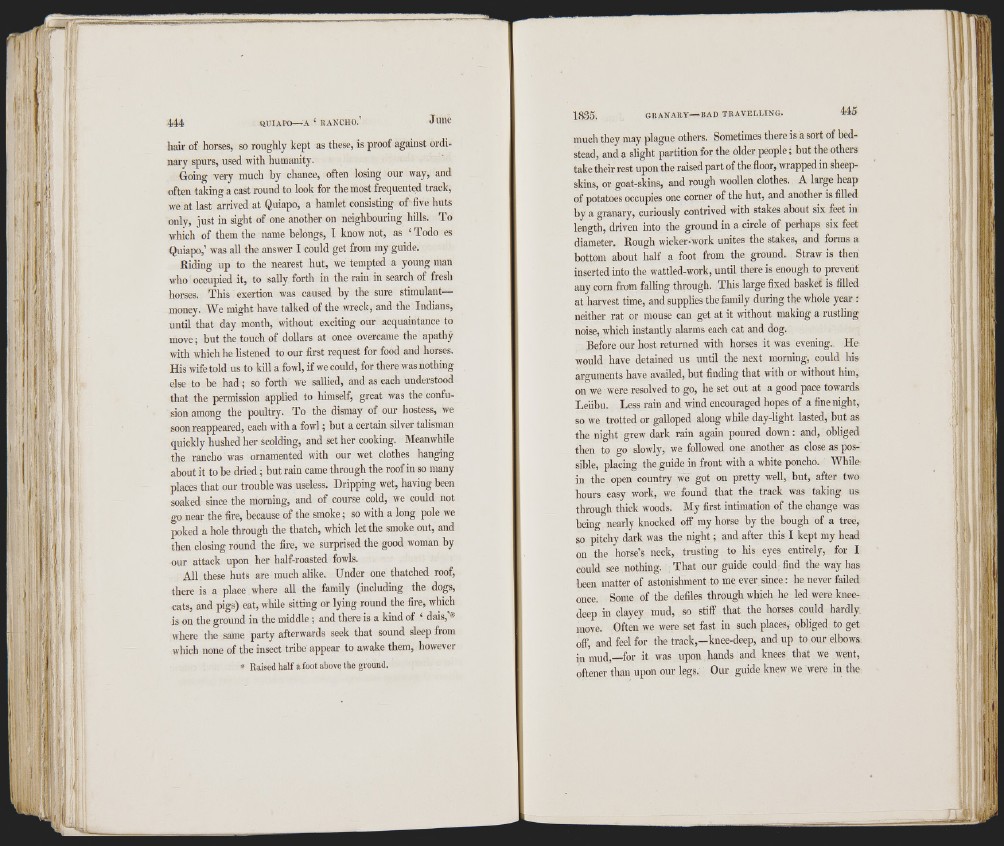
«iUIAl’O A ‘ RANCHO. June
hair of horses, so roughly kept as these, is proof against ordinary
spurs, used with humanity.
Going very much by chance, often losing our way, and
often taking a cast round to look for the most frequented track,
we at last arrived at Quiapo, a hamlet consisting of five huts
only, just in sight of one another on neighbouring hills. To
which of them the name belongs, I know not, as ‘ Todo es
Quiapo,’ was all the answer I could get from my guide.
Riding up to the nearest hut, we tempted a young man
who occupied it, to sally forth in the rain in search of fresh
horses. This exertion was caused by the sure stimulant—
money. tVe might have talked of the wreck, and the Indians,
until that day month, without exciting our acquaintance to
move; but the touch of dollars at once overcame the apathy
with which he listened to our first request for food and horses.
His wife told us to kill a fowl, if we could, for there was nothing
else to be h ad ; so forth we sallied, and as each understood
that the permission applied to himself, great was the confusion
among the poultry. To the dismay of our hostess, we
soon reappeared, each with a fowl; but a certain silver talisman
quickly hushed her scolding, and set her cooking. Meanwhile
the rancho was ornamented with our wet clothes hanging
about it to be dried; but rain came through the roof in so many
places that our trouble was useless. Dripping wet, having been
soaked since tbe morning, and of course cold, we could not
o’o near the fire, because of the smoke; so with a long pole we
Uked a hole through the thatch, which let the smoke out, and
then closing round the fire, we surprised the good woman by
our attack upon her half-roasted fowls.
All these huts are much alike. Under one thatched roof,
there is a place where all the family (including the dogs,
cats, and pigs) eat, while sitting or lying round the fire, which
is on the ground in the middle ; and there is a kind of ‘ dais,’*
where the same party afterwards seek that sound sleep from
which none of the insect tribe appear to awake them, however
* Raised half a foot above the ground.
1835. GRANARY BAD TRAVELLING. 445
much they may plague others. Sometimes there is a sort of bedstead,
and a slight partition for the older people; but the others
take their rest upon the raised part of the floor, wrapped in sheepskins,
or goat-skins, and rough woollen clothes. A large heap
of potatoes occupies one corner of the hut, and another is filled
by a granary, curiously contrived with stakes about six feet in
length, driven into the ground in a circle of perhaps six feet
diameter. Rough wicker-work unites the stakes, and forms a
bottom about half a foot from the ground. Straw is then
inserted into the wattled-work, until there is enough to prevent
any corn from falling through. This large fixed basket is filled
at harvest time, and supplies tbe family during the whole yeai-:
neither rat or mouse can get at it without making a rustling
noise, which instantly alarms each cat and dog.
Before our host returned with horses it was evening. He
would have detained us until the next morning, could his
arguments have availed, but finding that with or without him,
on we were resolved to go, he set out at a good pace towards
Leiibu. Less rain and wind encouraged hopes of a fine night,
so we trotted or galloped along while day-light lasted, but as
the night grew dark rain again poured down: and, obliged
then to go slowly, we followed one another as close as possible,
placing the guide in front with a white poncho. While
in the open country we got on pretty well, but, after two
hours easy work, we found that the track was taking us
through thick woods. My first intimation of the change was
being nearly knocked off my horse by the bough of a tree,
so pitchy dark was tbe night; and after this I kept my head
on the horse’s neck, trusting to his eyes entirely, for I
could see nothing. That our guide could find the way has
heen matter of astonishment to me ever since : he never failed
once. Some of the defiles through which he led were knee-
deep in clayey mud, so stiff that the horses could hardly
move. Often we were set fast iu such places, obliged to get
off, and feel for the track,—knee-deep, and up to our elbows
in mud,—-for it was upon hands and knees that we went,
oftener than upon our legs. Our guide knew we were in the
■t i
19 1
l i ;
*'i
>|ll s
i.i
A 11
It